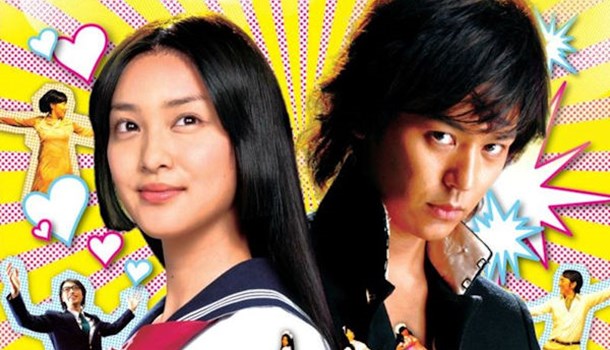
Written by Hayley Scanlon on 14 Oct 2012
Distributor N/A • Certificate N/A • Price N/A
Once again Miike proves there’s nothing he won’t try - last seen on the festival circuit with stately period remakes of Thirteen Assassins and Hara-Kiri he returns with another ‘period’ piece, this time tackling 1970s manga Ai to Makoto. Not only that, he’s done it as a hugely idiosyncratic musical pastiche filled with intentionally cheesy 70s J-pop accompanied by often hilarious dance routines... oh, and a really surprising amount of street fighting violence. This might be Miike’s most fun film yet and it’s certainly one that only he could have made!
The film opens with an animated sequence in which a young girl has a dangerous accident and is rescued by a young boy, somewhat reluctantly when he realises she comes from a wealthy family. Years later the girl, Ai (Emi Takei), spots the boy, Makoto (Satoshi Tsumabuki), during a violent altercation with a street gang. Feeling partly responsible for some of the things that have happened to him since their earlier encounter and feeling sure of his (fairly deeply buried it has to be said) good-hearted nature, she feels compelled to teach him that violence is never the answer. However, her initial attempts backfire and see our hero packed off into juvenial detention - from which she duly rescues him by convincing her family to pay for him to attend her swanky elite high school.
However, this doesn’t sit well with Ai’s devoted yet unrequited suitor Iwashimizu (Takumi Saito), or with the school authorities unused to such bare-faced rebelliousness. It’s not long before Makoto’s kicked back out to the local delinquent’s school where he quickly earns the affections of both the bossy Gumko (Sakura Ando) and studious Yuki (Ito Ono). A simple thing like a school transfer isn’t enough to stop true love though, as Ai followed by Iwashimizu both chase their loves into the lion’s den. Can Ai finally tame Makoto’s wild heart and revive the tenderness of his youth?
If you took the testosterone filled energy of Crows Zero and mixed it with the ridiculousness of The Happiness of the Katakuris whilst liberally sprinkling some of Yatterman’s total detachment from reality as we know it, it still wouldn’t come close to describing how off the wall this film is. Songs just creep up out of nowhere and dance routines with a glorious sense of surreality erupt with nary a word of warning. The pop songs more often that not reflect the tone or emotion of the moment rather than the direct circumstances, but are always presented with a knowingness that prevents them becoming over sentimentalised or disrupting the delicate balance of the film’s melodramatic themes. It really shouldn’t work but Miike manages to elicit just the right balance of seriousness and irony in his performances, perfectly pitching the film so that it never slips over into becoming too saccharine or too silly.
Casting the thirty year olds Tsumabuki and Saito as high schoolers might raise a few eyebrows, especially as love interests Emi Takei and Ito Oni are only around half their age, but somehow it all seems to work out. Well, if you can cast forty-eight year old Tsuyoshi Ihara as a high school boy (albeit one with an ‘ageing disease’) you can probably get away with anything.
At heart it’s a simple story - rich girl falls for delinquent poor boy whose heart of gold only she can see. Indeed, as bad boys go Makoto is certainly a piece of work - barely speaking, brooding, punching everything that moves. His feelings for Ai seem to flit between indifference and contempt while it seems all he needs to do make women folk fall in love with him is punch them in the face. Like all rebellious teens though he has his own past traumas that lead him into an outright rejection of any kind of affection, not to mention do-gooding rich girls determined to sacrifice themselves on his behalf. Iwashimizu’s love, by contrast, is of the purest sort - if Ai’s heart lies with Makoto then Iwashimizu will do whatever it takes to ensure her happiness even at the cost of his own.
Simply put, For Love’s Sake is one of the most enjoyable films to come out of Japan in, well, forever! As well as being extremely impressive visually and an enormous amount of fun it even manages to become quite moving in the end. Lightly touching on themes of class, parental neglect and lost love it perhaps doesn’t live up to the weightiness of its title (as well as being the names of the protagonists the Ai 愛 of the title means ‘love’ and Makoto 誠 ‘truth’) if taken literally - perhaps an intended irony - but it does deliver a great deal of fun. Miike does it once again, delivering a huge dose of high octane drama with its tongue firmly in its cheek - it cannot be recommended highly enough!
For Love's Sake (Ai to Makoto), also known as The Legend of Love and Sincerity, was screened as part of 56th BFI London Film Festival 2012
posted by Richard Durrance on 12 Feb 2026
posted by Richard Durrance on 10 Feb 2026
posted by Richard Durrance on 07 Feb 2026
posted by Richard Durrance on 03 Feb 2026
posted by Richard Durrance on 27 Jan 2026
posted by Richard Durrance on 19 Jan 2026
posted by Richard Durrance on 08 Jan 2026
posted by Richard Durrance on 17 Dec 2025